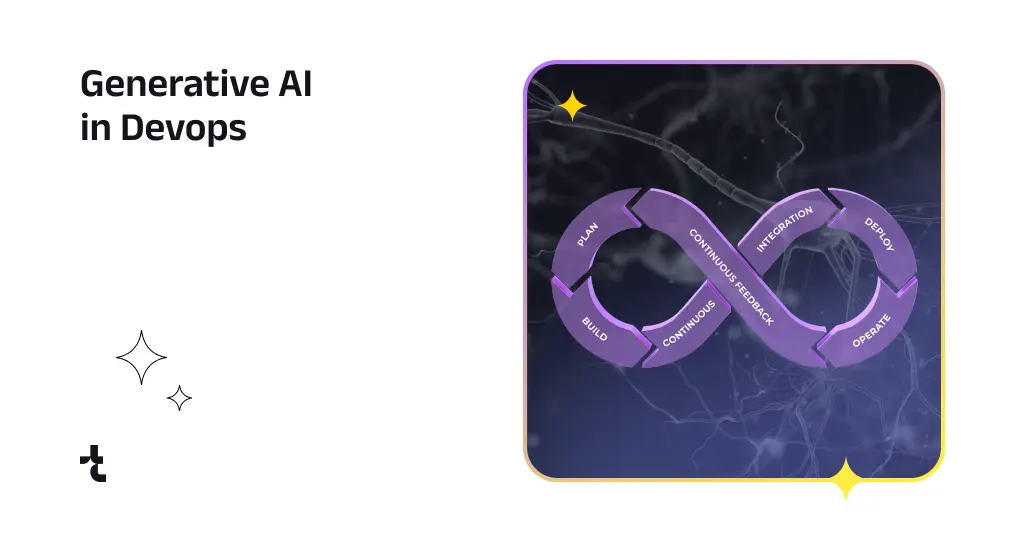How Can a DevOps Team Take Advantage of Artificial Intelligence
April 2, 2025
Teams are always seeking ways to enhance the efficiency, reliability, and quality of their products. DevOps management is a set of practices that combines software development and operations. Its goal is to shorten the development life cycle and deliver software continuously with high quality. Even with DevOps in place, there’s still room for improvement, and that’s where artificial intelligence plays a key role.
In the post, we explore how to apply AI in DevOps and make these processes even smarter, faster, and more predictable.
Understanding AI for DevOps
Artificial Intelligence simulates human intelligence in machines that are designed to think and act like people. When DevOps works with AI, it can automate complex processes, predict outcomes, and provide insights that humans may miss. This significantly improves the DevOps workflow.
So, how can a DevOps team take advantage of artificial intelligence? Let’s break down the most popular use cases, starting with the good old mundane routine automation.
Automated code reviews and testing
One of the first areas where AI impacts DevOps is in code reviews and testing. Traditionally, reviewing code for errors and ensuring quality has been time-consuming and prone to human mistakes. AI-driven tools can automate this process, quickly going through code to find bugs, security issues, and violations of coding standards. AI can also learn from past commits and reviews, improving its accuracy over time.
For example, tools like DeepCode use AI to analyze your code and provide suggestions for improvement. This gives you a faster expert review of your code, available 24/7. Such automation speeds up development and helps maintain high-quality code.
Predictive analytics for better decision-making
Predictive analytics is another area where AI excels in DevOps. By analyzing historical data, AI can forecast future trends, identify potential failures, and assess the impact of changes in the development process. This information is invaluable for making informed decisions and preventing issues before they happen.
Imagine deploying a new feature and being able to predict how it will affect system performance or if it might cause downtime. With AI, this is possible. Tools like Splunk or New Relic use AI to monitor applications and infrastructure, providing real-time insights and predictive analytics to help teams foresee and manage risks.
Enhanced monitoring and incident management
Monitoring systems and dealing with incidents are crucial parts of DevOps. AI improves these processes by not just reacting to issues but also predicting them. Through machine learning algorithms, AI can analyze logs, metrics, and patterns to catch anomalies that might signal problems.
When an incident occurs, AI can help diagnose the problem, suggest fixes, and even automate the resolution in some cases. This proactive approach to incident management can greatly reduce downtime and boost system reliability.
For instance, IBM’s Watson AI has been used to predict and prevent IT incidents before they affect users. Watson analyzes large amounts of operational data, spots unusual patterns, and alerts teams to potential issues, allowing them to act before users are impacted.
Continuous learning and improvement
Let’s also take a quick look at how Generative AI, with its ability to process text and generate user-friendly outputs, can streamline the work of DevOps teams.
Generative AI improves IT operations by automating process workflows, managing risk assessments, optimizing infrastructure, and enhancing reporting and interfaces. Technologies like Generative Adversarial Networks and transformers are used in various stages of the DevOps lifecycle, including code generation, test generation, bug remediation, and automated deployment.
GenAI tools like GitHub Copilot are transforming how code is written and maintained. These tools suggest code snippets, complete partial code, and optimize existing code for better performance, taking advantage of AI models trained on large codebases.
In predictive analytics, GenAI enables smart scaling and resource allocation by analyzing historical data and usage patterns to predict future needs. This leads to better resource use and cost efficiency. In cloud environments like AWS or Azure, GenAI can automate deployment processes, analyze deployment environment performance, and make data-driven decisions for smooth and safe deployments.
GenAI excels at quickly identifying, diagnosing, and resolving operational and business issues, which improves the reliability and stability of DevOps processes. It analyzes system logs and metrics in real-time, spots anomalies, and suggests or implements immediate solutions to problems. This reduces manual workload on DevOps teams and fosters collaboration, communication, better use of resources, and improved system performance.
Despite its promise, adopting GenAI in DevOps faces challenges such as the time and financial costs of training data, limited knowledge of AI systems, the accuracy of AI output, and potential legal or ethical issues around copyright. However, as GenAI advances, it is expected to play a larger role in automating tasks, predicting and preventing production problems, managing and scaling infrastructure, and more.
Embrace AI for DevOps today and tomorrow
The combination of AI and DevOps can automate tedious tasks, predict and prevent issues, and promote continuous improvement. By using the power of AI, DevOps teams can boost their efficiency and productivity while delivering higher-quality products faster than ever. As AI technology evolves, its role in DevOps will become even more important, ushering in a new era of intelligent software development and operations.
If you’re still wondering how a DevOps team can benefit from AI, feel free to reach out for comprehensive consulting on your situation.
FAQ
How can DevOps take advantage of AI?
DevOps teams can use AI to automate repetitive tasks, enhance code reviews, predict system failures, improve incident management, and optimize CI/CD pipelines. AI also provides real-time monitoring and predictive analytics for smarter decision-making.
How to use AI with DevOps?
AI can be applied to DevOps through tools that automate testing, analyze logs, detect anomalies, predict infrastructure needs, and assist with code generation. Integrating AI-powered solutions like GitHub Copilot, Splunk, or IBM Watson helps teams work faster and more efficiently.
Can AI take over DevOps’ job?
AI will not fully replace DevOps engineers but will augment their work. Instead of replacing jobs, AI automates routine tasks and provides intelligent insights, allowing DevOps professionals to focus on strategy, architecture, and innovation.
What is the AI tool used for DevOps?
Common AI tools for DevOps include:
-
DeepCode – AI-powered code reviews
-
Splunk / New Relic – predictive analytics and monitoring
-
IBM Watson – incident prevention and resolution
-
GitHub Copilot – AI-assisted coding
What is MLOps?
MLOps (Machine Learning Operations) is the practice of applying DevOps principles to machine learning projects. It focuses on automating model development, deployment, monitoring, and scalability to ensure reliable and continuous ML operations.
What is the difference between DevOps and MLOps?
-
DevOps focuses on software development and operations, ensuring faster, high-quality application delivery.
-
MLOps is specialized for machine learning models, handling data pipelines, training, deployment, and monitoring of ML systems.



